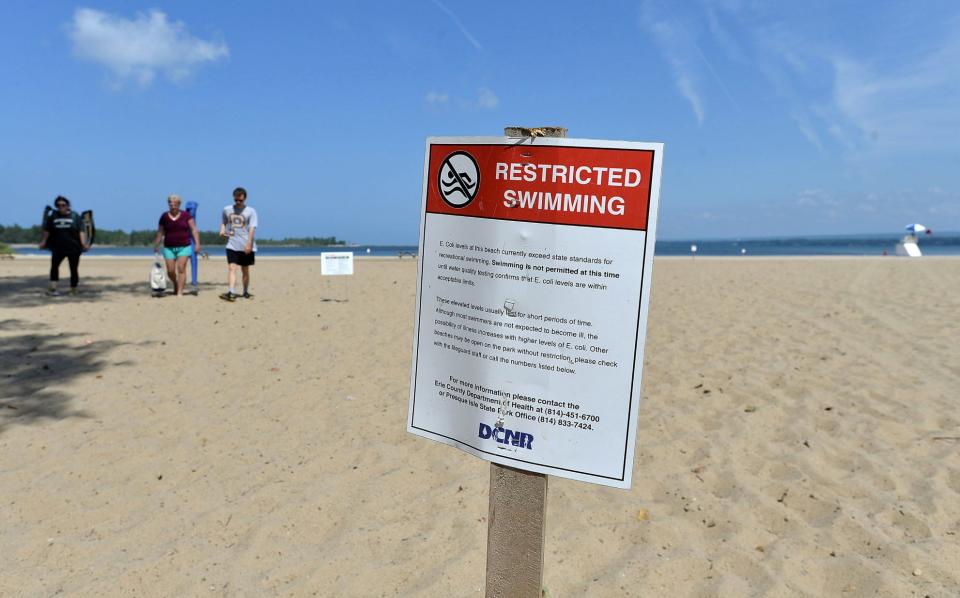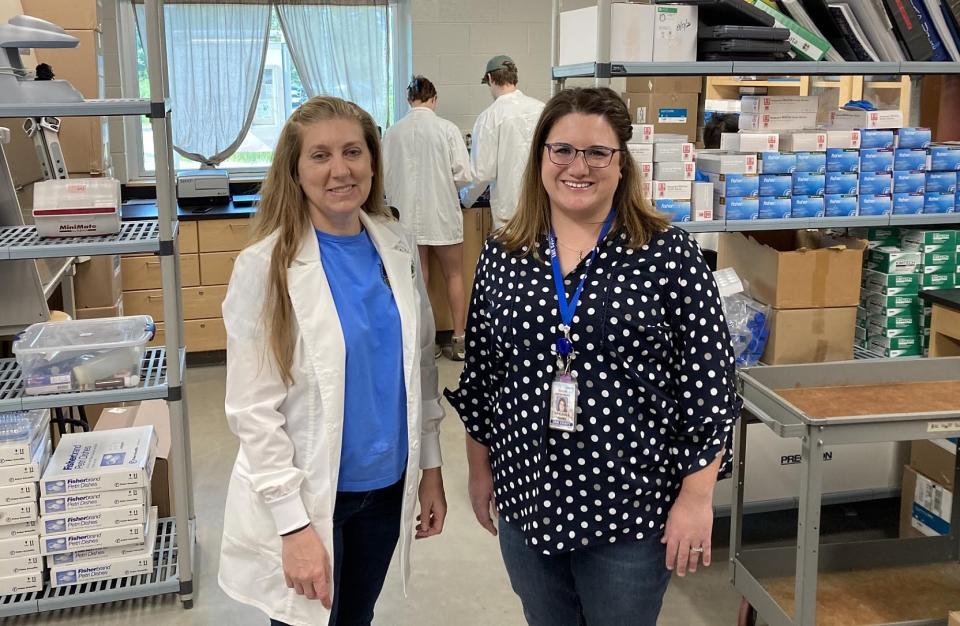E. coli closed Presque Isle beaches often in 2023. What workers do keeping swimmers safe
Jeanette Schnars, executive director of the Regional Science Consortium, wishes there was a single explanation why E. coli bacteria plagued the waters off certain Presque Isle State Park beaches last summer.
High levels of E. coli, a bacterium that is a strong indicator of sewage or animal waste, forced park officials to issue 87 swimming restriction days and 31 swimming advisory days in 2023. The park only issued one restriction day and six advisory days the previous two years combined.
No swimming was permitted at Beaches 6 and 8, perhaps the park's two most popular beaches, most days from late June until mid-July. Swimming was not allowed at Beach 11 after Aug. 15, more than two weeks before swim season ended at the park.
If there was just one reason why E. coli levels were so high in 2023, it would be easier to find a remedy, Schnars said.
"We are seeing multiple factors that could be playing a role," said Schnars, whose nonprofit organization tests the park's beach water for E. coli. "It can depend on weather patterns, how the wind is blowing and how the water is moving.

"It also could be due to high numbers of birds that gather on the beach," Schnars added. "We also haven't had much ice on Lake Erie and Presque Isle Bay in recent winters. The water down deep doesn't get as cold, so it warms up faster and allows E. coli to persist longer."
It's impossible for park officials to prevent high E. coli levels if they can't pinpoint the cause, Schnars said.
Sand grooming can help, but officials focused on dealing with restrictions
The park has undertaken some efforts over the years to reduce E. coli levels, including grooming the sand at certain beaches. Turning over the sand exposes more animal feces to sunlight, which kills E. coli.
Most of the park's efforts, however, are focused on dealing with swimming restrictions once they are announced.
"What we did last year was open Beach 1 or Beach 9 for swimming if Beach 6 and Beach 8 had restrictions," said Bob North, the park's lifeguard manager. "By the end of the season, we got it down to where, if we knew about the restriction the day before, we could move the lifeguard chairs, markers and signage so that the beach would open the next day at noon."
Lake Erie waters at Presque Isle State Park beaches, and at Freeport Beach in North East Township, are tested twice a week — usually Mondays and Tuesdays — for E. coli. It can cause gastrointestinal illness and skin rashes in humans, and is also an indicator of the presence of more harmful bacteria.
How much E. coli is needed to close a beach?
A swimming restriction is issued if samples contain 1,000 or more E. coli particles per 100 milliliters of water. A restriction also is issued if the beach's 30-day geometric mean is above the limit of 126 particles. The mean is determined by taking at least five water samples over a 30-day period.
High geometric means prompted longer-term restrictions at both Beach 6 and Beach 11 in 2023. The state requires the park to use geometric mean testing.
"Last year, we got an understanding of geometric mean and how it affects swimming restrictions," said Breanna Adams, director of environmental health services for the Erie County Department of Health. "We know that any storm event can kick up sediment from the bottom the lake and have an effect on E. coli levels. So, we watch when we collect samples, and make sure that we're not getting samples during those events just for the sake of getting samples."

Funding issues mean some E. coli tests can't be done
A test is available that could help solve the mystery of high E. coli levels. It determines whether the bacterium comes from humans or other animals.
"If the E. coli is human in origin, then we start looking at the streams and creeks just west of the peninsula," Schnars said. "The health department gets involved and tries to determine if there is a leaking septic system or something like that."
That test is not being performed due to a lack of funding, Schnars said.
"Costs are increasing and we just have enough funding for the tests we currently conduct," Schnars said.
Until more funding can be found and additional tests are performed, park officials will remain on guard for high E. coli levels and be ready to switch beaches on short notice.
"Our job is to protect the people swimming at Presque Isle," North said. "We're going to try and be proactive, and when swimming is restricted, we will let people know with signs and with the flags we use."
Beach advisories and restrictions also are posted on the Erie County government website, under "Departments," then "Erie County Department of Health."
Contact David Bruce at [email protected]. Follow him on X @ETNBruce.
This article originally appeared on Erie Times-News: Presque Isle State Park: Staff's E. coli monitoring efforts explained
